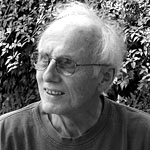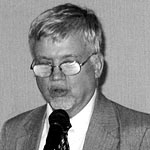

Jim Thatcher received his PhD from the University of Michigan in 1963, one of the first PhDs in Computer Science. Together with his thesis advisor, Dr. Jesse Wright, Jim then joined the Mathematical Sciences Department, IBM Research, in Yorktown Heights, New York. His research was in the area of mathematical computer science, automata theory, and data abstraction. Jim began moving away from the abstract and toward the practical when he and Dr. Wright, who is blind, began working on access to the PC for people who are blind. That project led to one of the first screen readers for DOS which, in 1986, became IBM Screen Reader (and the term later became generic). After that, Jim led the development of IBM Screen Reader/2 for OS/2, which was the first screen reader for the graphical user interface on the PC (1991).
In 1996, Jim left his research post to join the IBM Accessibility Center in Austin, Texas. There, he led the effort to establish the IBM accessibility guidelines specifically for use by IBM's development community.
Jim served as Vice-Chair of the Electronic and Information Technology Access Advisory Committee (EITAAC), which was impaneled by the Access Board to propose standards for Section 508. He chaired the subcommittee on Software Standards. He wrote the course on Web Accessibility for Section 508 for the Information Technology Technical Assistance and Training Center (ITTATC), which was funded by the General Services Administration and the Department of Education to support Section 508.
Jim has received numerous awards for technical work over his 37-year career with IBM. He received a Distinguished Service award from The National Federation of the Blind in 1994 and the Vice President's Hammer Award for his work with the Department of Education on the development of Software Accessibility Standards in 1999.
Jim is coauthor of Constructing Accessible Web Sites (along with Paul Bohman, Michael Burks, Shawn Lawton Henry, Bob Regan, Sarah Swierenga, Mark D. Urban, and Cynthia Waddell), published by glasshaus in 2002, and published again by Apress in 2003.

Michael R. Burks currently serves as Section 508 Analyst working on the accessibility of electronic and information technology. He is also the Webmaster and Public Information Officer of the International Center for Disability Resources on the Internet, a nonprofit organization dedicated to presenting disability resources and information to those who are dealing with disability issues.
Michael works with the Internet Society on disability issues, and has made presentations and taught tutorials on web accessibility and disability issues around the world.

Christian Heilmann grew up in Germany and, after a year working with people with disabilities for the Red Cross, spent a year as a radio producer. From 1997 onwards, he worked for several agencies in Munich as a web developer. In 2000, he moved to the U.S. to work for Etoys and, after the dot-com crash, he moved to the UK, where he led the web development department at Agilisys. In April 2006, he joined Yahoo! UK as a web developer.
Christian publishes an almost daily blog at www.wait-till-i.com and runs an article repository at www.icant.co.uk. He is a member of the Web Standards Project's DOM Scripting Task Force.

Shawn Lawton Henry leads the World Wide Web Consortium's (W3C) worldwide education and outreach activities promoting web accessibility for people with disabilities. She develops online resources to help web developers understand and implement web accessibility guidelines, and provides presentations and training on accessible web design and development with the Web Accessibility Initiative (WAI). Shawn has presented and published papers on accessibility and usability for Human Factors and Ergonomics Society (HFES), Computer-Human Interaction (CHI), Usability Professionals' Association (UPA), Web Design World, and many other conferences around the world (http://uiaccess.com/pres.html). Her publications also include the "Everyone Interfaces" chapter in User Interfaces for All (Lawrence Erlbaum Associates, 2000), Accessibility in the User-Centered Design Process (Georgia Tech Research Corporation, 2004), and other online resources (http://uiaccess.com/pubs.html).
Prior to joining W3C WAI, Shawn consulted with international standards bodies, research centers, government agencies, nonprofit organizations, education providers, and Fortune 500 companies to develop and implement strategies to optimize design for usability and accessibility (http://.uiaccess.com/experience.html). She developed UIAccess.com to share information on universal user interface design and "usable accessibility.
" Although Shawn holds a research appointment at the Massachusetts Institute of Technology (MIT) Computer Science and Artificial Intelligence Laboratory (CSAIL) and has a Massachusetts phone number, she actually lives in Madison, Wisconsin. When not typing on her small laptop, she can often be found paddling her long sea kayak.

Andrew Kirkpatrick serves as the cross-product Accessibility Engineer for Adobe Systems. Prior to joining Adobe, Andrew was Principal Accessibility Engineer at Macromedia, and Director of Technology at the National Center for Accessible Media (NCAM) at WGBH in Boston, with a focus on accessibility consulting for corporate clients including America Online, Yahoo!, BT, Apple, and Macromedia. In addition to activities with corporate clients at NCAM, Andrew managed projects focused on web and interactive media accessibility, and was the product manager for MAGpie (NCAM's software for creating captions and audio descriptions) and developer of STEP (NCAM's Simple Tool for [Accessibility] Error Prioritization).
Andrew is also Principal for Kirkpatrick Consulting, a web accessibility consultancy. Andrew lives in Massachusetts with his wonderful wife and three of the cutest kids ever.

Patrick H. Lauke currently works as Web Editor for the University of Salford, where he heads a small, central web team, which provides development, training, and advice to departmental web authors across the institution. In 2003, he implemented one of the first web standards based, XHTML/CSS-driven UK university sites.
Patrick has been engaged in the discourse on accessibility since early 2001, regularly contributing to a variety of web development and accessibility-related mailing lists and forums, taking an active role in the running of Accessify.com, moderating the Accessify forum, and joining the Web Standards Project Accessibility Task Force (WaSP ATF) in June 2005. In his spare time, Patrick pursues his passion for photography and runs a small web/design consultancy (www.splintered.co.uk).
With two years of Computer Sciences at the Swiss Federal Institute of Technology (ETH) in Zurich, followed by a switch to a Bachelor's degree in Graphic Design and a Masters in Creative Technology at the University of Salford, Patrick's background spans both technical and creative disciplines, which he feels are essential for a holistic approach to web design and development.
An outspoken accessibility and standards advocate (although he has been called an "evangelist," with only slight negative connotations, by some of his colleagues), Patrick favors a pragmatic hands-on approach to web accessibility over purely theoretical, highlevel discussions.
I'm an idealist by nature, but a pragmatist by trade. I'd never class myself as an expert, and I certainly don't have all the answers. . . I'm just an opinionated guy eager to find real world solutions where the rubber meets the road.

Bruce Lawson dreamed up Constructing Accessible Web Sites, the forerunner of this book. Previously, he worked as an actor and theater director, and a programmer with AT&T, before becoming a singer, guitarist, and tarot card reader in Istanbul, a volunteer pharmacist in Calcutta, a movie extra in Bombay, and a kindergarten teacher and tutor to the princess's daughter in Thailand.
Now, Bruce is a member of the Web Standards Project's Accessibility Task Force, and was one of the reviewers of the British Standards Institution's Publicly Available Specification (PAS) 78 - "Guide to Good Practice in Commissioning Accessible Websites." His interest in web standards is both philosophical (a good artisan uses the right tools, in the right way) and practical (I can get smaller pages, which Google likes). His interest in accessibility is thinly disguised self-interest, having been diagnosed with multiple sclerosis in 1999.
He blogs at www.brucelawson.co.uk, and lives in the UK, but wishes he lived somewhere warm.

Bob Regan is a solutions architect for vertical markets at Adobe Systems, Inc. In that role, he serves as the technical lead for the education, government, financial services, manufacturing, telecommunications, and life science markets. It is his responsibility to connect with the specific needs, challenges, and successes of customers working to create digital content and applications. He works with each team to help them collect customer experiences and communicate them into the product organization, and assemble solutions based on these requirements.
Bob's first role in the software world as an accessibility advocate continues to play an important part of his day-to-day life. Now with Adobe, he is part of a much larger team looking at accessibility issues from product design to engineering, from content authoring through to the end user. Ensuring that the Web is a great experience to us all remains a great passion of his.

Richard Rutter has been developing commercial websites for ten years. In 2000, he joined Citria as a user interface lead, where he introduced web standards to a staff of 150 in three offices across Europe. Richard was the producer on large e-commerce projects for clients including Barclaycard, on a finance portal that was the first commercial site to be built using CSS throughout and to meet Royal National Institute of the Blind (RNIB) accessibility requirements.
After two years at Citria, Richard joined Multimap. He was responsible for rebuilding Multimap's hugely successful website using web standards and for making the site accessible to a far wider audience. While at Multimap, Richard acted as accessibility consultant to a number of high-profile clients, including Ford Europe, Yell, and BT.
Richard is now cofounder and Production Director of Clearleft, a web consultancy specializing in accessible websites. Richard is also coauthor of the book Blog Design Solutions, in which he explains how to push the envelope of what can be achieved with weblog software and design. A more personal side of Richard can be found at Clagnut.com, a popular weblog where he writes about accessibility and web standards issues, as well as his passion for music and mountain biking.

The Honorable Mark Urban is Chairman of the North Carolina Governor's Advocacy Council for Persons with Disabilities. He is a member and past Chair of the Board of Directors for the International Center for Disability Resources on the Internet, and a member and past Vice Chairman of the International Committee for Information Technology Standards, V2 (IT Access Interfaces). He was chief executive of a municipality during the implementation of the Americans with Disabilities Act, and a reservist in the United States Navy. He is an experienced technical architect and IT policy developer. Mark currently does project management and consulting on accessibility and related IT and disability matters with federal, state, and local agencies and the businesses that supply them.
Mark lives in Raleigh, North Carolina, with his supportive friends and family, two cats, and two "attack Chihuahuas.
" To them and their support of his endeavors, he sincerely dedicates this book.
Cynthia D. Waddell is the Executive Director of the International Center for Disability Resources on the Internet (ICDRI). She provides leadership and project oversight in carrying out ICDRI's mission to increase opportunities for people with disabilities by identifying barriers to participation and promoting best practices and universal design of technology for the global community.

In the world of accessibility, Cynthia Waddell is a nationally and internationally recognized expert in the field of electronic and information technology, as well as employment and construction. Named in the "Top 25 Women on the Web" by Webgrrls International in 1998, she received the first U.S. Government Technology Magazine award in 2003 for Leadership in Accessibility Technology and For Pioneering Advocacy and Education.
The free Cynthia Says web accessibility tool and portal was named after her and endorsed by the American Council of the Blind. The Cynthia Says portal is a joint Education and Outreach project of ICDRI, The Internet Society Disability and Special Needs Chapter, and HiSoftware.
Seeking a solution for access to information on the Web for the community of people with disabilities, Cynthia Waddell authored the first accessible web design standard in the U.S. that was recognized as a best practice by the federal government and contributed to the eventual passage of legislation, including the Electronic and Information Technology Accessibility Standards (Section 508). Her seminal paper, "The Growing Digital Divide in Access for People with Disabilities: Overcoming Barriers to Participation," was commissioned by the Clinton Administration and has been translated and cited by foreign governments, businesses, universities, disability organizations, and entities around the world.
Cynthia Waddell combines her expertise in disability legislation, public policy, and technology to provide education and professional consulting services for government, higher education, and businesses. She serves as the accessibility quality assurance lead for awardwinning government portals and provides Section 508 VPAT assistance for technology vendors. Active in a number of organizations, she is the North America Chair of the International Commission on Technology and Accessibility (ICTA), a Standing Commission of Rehabilitation International, and Vice-Chair of The Internet Society Disability and Special Needs Chapter.
Cynthia Waddell's work includes consultancies for the United Nations as an expert in accessible information and communication technologies (ICT) and for the body developing an international treaty on the rights of persons with disabilities. This is similar to her participation on the Portuguese International Accessibility Board that led to Portugal's adoption of the Portuguese Accessibility Guidelines for websites in 1999.
In 2003, Cynthia Waddell served as the accessible technology expert for the Bush Administration UK-U.S. seminar exchange on employment and technology; following her work for several years in the "Boosting the UK Digital Economy—A Virtual Think Tank." In addition, she was the sole U.S. speaker at the 2001 "Design for All European Day of Disabled People" at the invitation of the European Commission and the European Disability Forum.
Cynthia Waddell has keynoted at many government, university, and industry forums in the U.S. and abroad. For example, in 2005 she presented at the UN World Summit on the Information Society at the invitation of Pacific Rim consortium. In 2004, she spoke at the U.S. National Summit for Disability and Distance Education in Washington D.C. She also spoke in Tokyo, Japan at an ICT symposium and at a meeting of Diet members in conjunction with the launch of the first accessible web requirements in the Japanese Industrial Standards. She also spoke at the "Accessibility for All" conference in Nice, France for the European Union (EU) Standardization bodies, an event that was part of the EU "Design for All" initiative for access to products, services, and the environment.
Cynthia Waddell is a Lecturer in Law at her alma mater and holds a Juris Doctor from Santa Clara University School of Law. She was designated a Public Interest Disability Rights Scholar and a Dan Bradley Fellow for the Employment Law Center in San Francisco, California. In addition, she was a Rotary International Foundation Fellow at Exeter University, England, as well as an USC-Cambridge University Scholar at Cambridge University, England. She received her B.A., cum laude, from the University of Southern California.